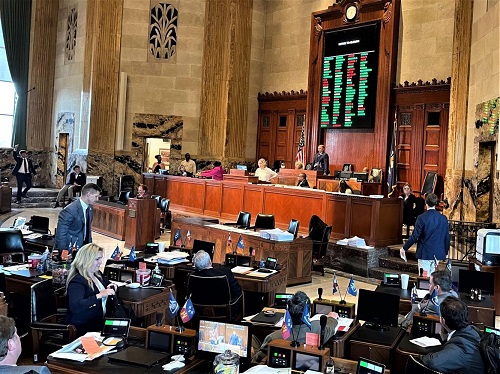
3.29.22 – The Advocate
Republican majorities in both chambers of the Louisiana Legislature voted Tuesday night to adjourn the annual general session in order to allow a special session Wednesday to try to override Democratic Gov. John Bel Edwards’ veto of bills that would set election districts that would all but guarantee GOP dominance in the congressional delegation for another 10 years.
Senators voted 26-12 along party lines to inform the House they planned to recess for more than three days. Later, the House voted 67-26 to pause its business until Monday.
Edwards says the findings of the latest U.S. Census indicate that African Americans should have the opportunity to elect two Black persons to Congress, instead of just one of the six seats. And Black residents live close enough together that two districts could be drawn, which is what the federal Voting Rights Act of 1965 says should happen.
Senate Bill 5 and House Bill 1, which are nearly identical, detail who can vote in each of Louisiana’s six congressional districts. With some adjustments to fit changes in the U.S. Census, the districts are very close to the ones that elected five White Republicans and one Black Democrat for the past decade. The House needs 70 votes and the Senate needs 26 to override the vetoes.
The special veto override session, which begins at noon Wednesday, is the second time the Republican majority in the Legislature has aimed at negating Edwards’s refusal to sign some of their bills into law.
The GOP lost a veto override battle during the summer. But what really makes a difference this time is that the override session, the date of which is set in the Constitution, falls during the regular annual session of the Legislature, which also is set in the Constitution.
Lawmakers can’t find an instance in which the Legislature held two sessions at the same time and the law is silent on the issue. So legislative leadership is pretty much making it up as they go along. Republican leadership recessed the regular session Tuesday night until Monday afternoon. While adjourned, they’ll convene the veto override session.
A May 1989 opinion by then Attorney General William Guste determined that the state Constitution was silent on the issue and wrote: “the Legislature may adjourn the current regular session, convene itself into an extraordinary session and then resume the regular session upon the adjournment sine die of the extraordinary session.” But attorney general opinions are just that, the views of learned lawyers but carry no weight in law.
“Never before in the history of this state have we had two sessions at once,” state Sen. Cleo Fields, a Baton Rouge Democrat, told his Senate colleagues. “We don’t have to do this. We just don’t. We don’t need an override session. We can still accomplish the same thing.”
Lawmakers could file another bill, pass it and when vetoed by the governor, override his decision in due time without damaging the Constitution by adjourning a regular session prematurely.
Across Memorial Hall in the Louisiana House, New Orleans Democratic Rep. Royce Duplessis asked for a legal basis for having two sessions run at the same time.
House Speaker Clay Schexnayder, a Gonzales Republican and a former mechanic, conferred with House Clerk Michelle Fontenot and his lawyers before answering that once the regular session adjourns, the two sessions won’t be running concurrently.
Duplessis pointed out that the law says an override session begins 40 days after the most recent session. He argued that the most recent session was the annual general session that Schexnayder wanted to end.
First the House first voted 71-32 to accept the Senate’s adjournment for more than three days.
Then, the House voted 67-26 to pause its business until Monday. One reason for the lower vote could be because only Democratic representatives requested a lock-out, meaning only members who were present at the time of the vote could participate. The voting machine acted up, so Schexnayder required all the representatives to return to their seats and raise their hands if they wanted a lock-out. The voting machine was working again by the time of the actual vote.
“Anything we pass this session could be jeopardized and subject to a legal challenge because of what we just did,” including the state’s operating budget, House Democratic Caucus Chair Sam Jenkins, of Shreveport, said as his colleagues gathered their belongings to leave.
Staff writers Tyler Bridges and Sam Karlin contributed to this report.
